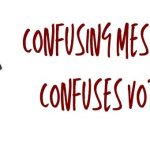When you’re running for local office, it’s easy to think that words are the easy part. After all, you already know your values, your community, and what you stand for. Why not just write it yourself?
But here’s the truth: the words on your campaign website, print materials, and social posts are your first impression. And when you’re up against limited resources and low name recognition, your copywriting has to work overtime.
Who’s Writing Your Political Campaign Content?
In many small or down-ballot campaigns, the answer is: you. Or maybe a friend, a spouse, or a volunteer with a knack for writing. That’s completely normal, and often necessary. Even if you’re writing your own campaign messaging, the goal should be to make your message clear, focused, and voter-friendly.
You don’t need to sound like a political consultant. But you do need to sound like someone who’s ready to lead—and connect with voters.
Who’s Editing Your Campaign Materials?
Editing goes beyond just finding typos and grammatical errors. You want to make sure that your campaign copywriting:
- Gets to the point
- Uses plain, persuasive language
- Doesn’t ramble or confuse the reader
- Ends with a clear call to action (donate, volunteer, share)
If you can, have someone else read your drafts. Ask: “Does this sound like a leader?” “Would this make someone want to support me?” Bonus points if that person isn’t already on your team.
Do You Need to Write Like a Pro?
Not necessarily. But the goal is to make sure your campaign content does its job, no matter what form it takes. Whether it’s explaining your platform, introducing you to voters, creating voter outreach materials, or getting someone to take action, good political writing helps you:
- Tell your story clearly
- Explain your priorities and platform summary
- Earn credibility
- Build trust with voters
You don’t have to be flashy. But you do need to be understandable and consistent across platforms. That might mean hiring a political writer, working with a professional campaign writer, or simply getting some help shaping your message to make sure it resonates with your target voters.
If you’re writing it all yourself, and you find yourself staring at a blank screen or rewriting the same paragraph five times, you’re not alone.
Writing a Candidate Bio That Feels Real
Your candidate biography is often one of the first things voters read, so you don’t want to mess it up.
The best bios don’t try to sound like a resume. (You’d be surprised how many resumes we get as ‘About the Candidate’ content.) Instead, your bio should briefly explain who you are, why you’re running, and what values guide you. Keep it conversational, relevant to your race, and easy to follow.
Whether you’re running for city council, school board, or a county-level position, your bio should reflect how you’ve shown up for your community, and how you plan to keep doing so.
It should sound like you, just a more polished version. You might be struggling to find the right words to describe yourself, but take your time. Focus on shaping your story, tightening your message, and polishing your copy until it sounds clear and confident. Write both a full-length version and a one-sentence version you can reuse. And remember: this bio will be used again and again—on your website, social media, and print materials—so it’s worth getting right.
Tip: Write your bio in third person, but make sure it still sounds personal.

Explaining Where You Stand on the Issues
For many voters, issue pages are where they look to decide whether you’re worth supporting. But candidates often overthink them—or skip them entirely.
You don’t need to cover every topic. Focus on the three to five key issues that matter most to your community and are relevant to the office you’re running for. Keep each explanation short, specific, and in plain English.
You’re not writing a thesis on each issue (this means you, judicial candidates!). Instead, show that you understand the problem and have a reasonable approach to solving it.
Whether you’re writing your own materials or working with a freelance campaign copywriter, the message still needs to reflect your unique voice and priorities.
Tip: End each issue section with a line about why it matters to voters, not just to you.
Why It Matters for Local Candidates
Your opponent might have name recognition, but you might not. But your campaign website content, social posts, and mailers are your chance to catch up.
When voters search for you, what will they find? A blank Facebook page, or a site with your story, your platform, and a way to help?
Great writing builds trust. It helps people understand what you stand for. And it shows that you’re serious—even if you’re just getting started.
What You Say—and How You Say It—Matters
If you’re writing your own content, take the time to do it right. Focus on clarity, credibility, and connection.
Good copy doesn’t need to be fancy. It just needs to work.
? Online Candidate offers affordable copy editing services for political campaigns—from proofreading to complete rewrites. Whether you’re building your first campaign website or polishing a mailer, we’ll help you say what you mean and say it well.
« Are You Ready for a Political Campaign? Take the Survey and Find Out!How to Beat an Incumbent Candidate: Campaign Strategies That Work »
Tags: personal branding, press releases, reputation management







